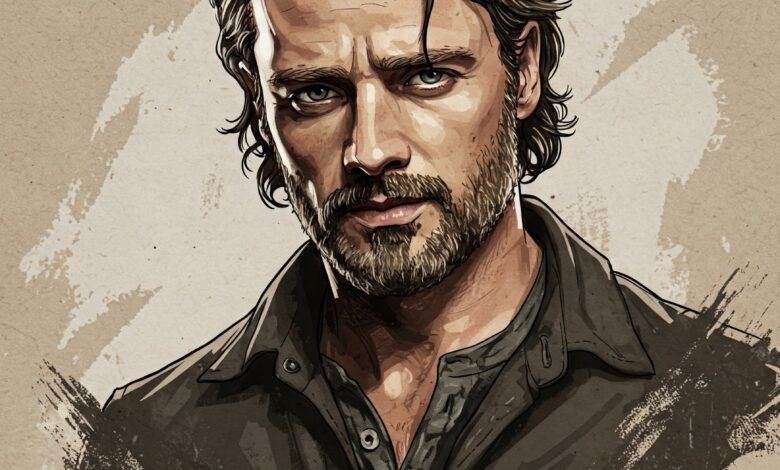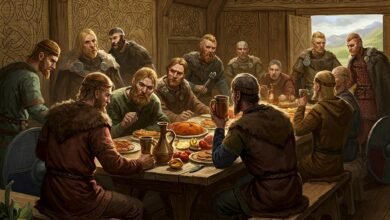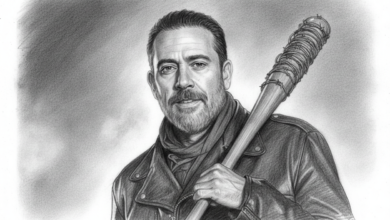The Journey of Rick Grimes: From Sheriff to Survivalist in The Walking Dead

Introducing Rick Grimes: The Sheriff at the Center of Chaos
Rick Grimes stands as an emblematic figure in the sprawling narrative of “The Walking Dead,” a character whose journey from lawman to survivalist resonates deeply with audiences. Before the world succumbed to chaos and the undead, Rick served as a sheriff’s deputy in the serene landscapes of Georgia. His dedication to his role was not merely occupational; it stemmed from a profound sense of duty and an unwavering commitment to uphold justice. This foundation laid the groundwork for the man he would become in the face of relentless adversity.
Prior to the apocalypse, Rick was characterized by his strong moral compass and unwavering affinity for law and order. This commitment was evident in his relationships, particularly with his wife, Lori, and their son, Carl. The bonds he forged with his family underscored his motivations; protecting loved ones encapsulated his essence as both a father and husband. His relationships provided him motivation, fueling his resolve to create a secure environment, even amidst chaotic circumstances. Rick’s dedication to his role as a deputy and his ability to forge strong connections reflect the complexities of his character, setting him apart as a formidable leader.
As he transitioned into a world ravaged by the undead, Rick’s previous experiences as a sheriff’s deputy became pivotal in shaping his leadership style. The principles instilled in him while enforcing the law began to clash with the harsh realities of survival. His unwavering sense of justice often put him at odds with the shifting moral landscape, exposing the struggles he faced as he adapted to becoming a survivalist. Throughout this transformation, Rick remains a quintessential example of how fundamental ideals may be challenged when the norms of society crumble. His character arc serves as a captivating exploration of humanity’s resilience amidst chaos.
The Evolution of a Leader: Challenges and Growth
Rick Grimes’ transformation from a small-town sheriff to a resilient survivalist stands as one of the most compelling arcs in The Walking Dead. The character’s journey is marked by significant challenges that shape his leadership style and moral compass. Initially, Rick’s adherence to the law serves as his guiding principle, but as the series progresses, this foundation is tested repeatedly by the harsh realities of a post-apocalyptic world.
One of the pivotal moments in Rick’s evolution occurs during the loss of significant characters from his life. Each death serves not only as a personal tragedy but also as a catalyst that forces Rick to confront his own vulnerabilities and reassess his role as a leader. The emotional weight of these losses contributes to a hardened exterior, suggesting that the inability to protect those he loves catalyzes his transformation into a more pragmatic survivor. As the group faces ever-increasing threats, including rival factions, the power struggles within the group create additional layers of complexity to Rick’s leadership.
Moral dilemmas abound in Rick’s journey, particularly in the decisions he must make to ensure the survival of his group. Situations arise where traditional ethics conflict with the instinctual need for survival, prompting Rick to navigate a gray area of morality. The shift in dynamics among the group further complicates his role; as leaders emerge from within the ranks, Rick must learn not only to be authoritative but also to be more democratic and compassionate. These adaptations illustrate his growth as a leader willing to evolve based on circumstances and the people he leads.
Through his experiences, Rick Grimes embodies the struggle to reconcile personal morality with the demands of leadership in a lawless environment. This journey of transformation invites viewers to reflect on the nature of leadership itself, emphasizing that true growth often comes from facing adversity head-on.
Relationships and Allies: The Bonds That Define Rick
Throughout the course of “The Walking Dead,” the relationships formed by Rick Grimes play a pivotal role in shaping his character and decisions. From his early encounters to deepening connections amid the chaos of a post-apocalyptic world, his bonds with family and friends illustrate the complexities of survival and humanity. Chief among these relationships is that with his wife, Lori Grimes. Their marriage, fraught with emotional turmoil and challenges, showcases the struggle of maintaining love and commitment in a world filled with constant danger. Lori’s guidance and eventual passing serve as significant turning points for Rick, pushing him to grapple with his sense of responsibility and guilt.
Additionally, the dynamic with Rick’s best friend, Shane Walsh, adds layers of complexity to his narrative. Initially, Shane represents the brotherhood and camaraderie essential for survival; however, as the story progresses, their friendship becomes strained due to differing philosophies on leadership and morality. Shane’s betrayal ignites pivotal revelations in Rick, prompting him to re-evaluate his ethical compass while showcasing the tumultuous nature of alliances formed during crises. This evolution underscores the theme of loyalty and the moral dilemmas posed in a world where survival often supersedes personal relationships.
Rick’s relationship with his son, Carl, is particularly significant, capturing the essence of fatherhood in a harsh reality. As the series unfolds, Carl becomes a crucial figure not only for Rick’s sense of purpose but also in highlighting the innocence lost amid the horrors surrounding them. Their bond evolves, reflecting the necessity of mentorship and the bittersweet burden carried by Rick as he strives to keep his son safe. In conclusion, these key relationships profoundly impact Rick Grimes, illustrating how human connections serve as both a source of strength and conflict, ultimately defining his journey as a survivor.
Rick Grimes’ Legacy: Impact on The Walking Dead Universe
Rick Grimes, portrayed by Andrew Lincoln, is undeniably one of the most pivotal characters in The Walking Dead universe. His evolution from a small-town sheriff to a hardened survivalist encapsulates the essence of the series, providing a profound exploration of survival, humanity, and hope in a post-apocalyptic world. Throughout the show, Rick’s decisions, often fraught with moral complexity, have significantly influenced the trajectory of numerous characters, propelling them toward their own arcs of development.
The relationships Rick fostered—whether they were adversarial or loyal—serve as testament to his leadership and the impact he had on those around him. Characters such as Daryl Dixon and Michonne experienced transformative journeys partly fueled by Rick’s unwavering resolve and moral compass. His ability to forge connections, even in the direst of circumstances, highlights a theme central to The Walking Dead: the search for community and the human desire to cling to hope amidst chaos.
Moreover, Rick Grimes’ influence extends beyond the characters within the series and into the vast fandom. By embodying resilience and vulnerability, he has become a symbol of existential struggle against apathy, fear, and loss. Fans resonate with his journey, often engaging in passionate discussions about his philosophies and decisions, reflecting on what it means to maintain one’s humanity in an increasingly desolate world.
Rick’s departure from the series marked a significant turning point in the narrative, yet his legacy continues to pervade The Walking Dead universe. The series’ themes echo his defining philosophy: survival requires not only physical strength but also the capacity for compassion and empathy. As new characters rise to prominence, the foundation laid by Rick Grimes ensures his spirit remains integral to the storytelling, ultimately shaping the future trajectories of the franchise.





















